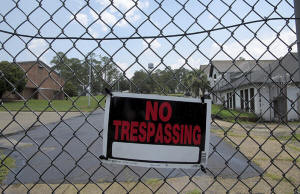Hundreds apply for restitution for abuse suffered at Florida reform
schools
 Send a link to a friend
Send a link to a friend
 [January 02, 2025]
By KATE PAYNE [January 02, 2025]
By KATE PAYNE
Hundreds of people who say they suffered physical or sexual abuse at two
state-run reform schools in Florida are in line to receive tens of
thousands of dollars in restitution from the state, after Florida
lawmakers formally apologized for the horrors they endured as children
more than 50 years ago.
At its peak in the Jim Crow 1960s, 500 boys were housed at what is now
known as the Dozier School for Boys, most of them for minor offenses
such as petty theft, truancy or running away from home. Orphaned and
abandoned children were also sent to the school, which was open for more
than a century.
In recent years, hundreds of men have come forward to recount brutal
beatings, sexual assaults, deaths and disappearances at the notorious
school in the panhandle town of Marianna. Nearly 100 boys died between
1900 and 1973 at Dozier, some of them from gunshot wounds or blunt force
trauma. Some of the boys' bodies were shipped back home. Others were
buried in unmarked graves that researchers only recently uncovered.

Ahead of a Dec. 31 deadline, the state of Florida received more than 800
applications for restitution from people held at the Dozier school and
its sister school in Okeechobee, Fla., attesting to the mental, physical
and sexual abuse they endured at the hands of school personnel. Last
year, state lawmakers allocated $20 million to be equally divided among
the schools’ surviving victims.
Bryant Middleton was among those who spoke publicly in 2017, when
lawmakers formally acknowledged the abuse. Middleton recalled being
beaten six times for infractions that included eating blackberries off a
fence and mispronouncing a teacher’s name after being sent to Dozier
between 1959 and 1961.
[to top of second column]
|

In this July 13, 2011 photo, the buildings that housed the Dozier
School for Boys. (AP Photo/Brendan Farrington, File)

“I’ve seen a lot in my lifetime. A lot of brutality, a lot of
horror, a lot of death,” said Middleton, who served more than 20
years in the Army, including combat in Vietnam. “I would rather be
sent back into the jungles of Vietnam than to spend one single day
at the Florida School for Boys.”
Allegations of abuse have hung over the Dozier school since soon
after it opened in 1900, with reports of children being chained to
the walls in irons. When then-Gov. Claude Kirk visited in 1968, he
found the institution in disrepair with leaky ceilings, holes in
walls, no heating for the winters and buckets used as toilets.
“If one of your kids were kept in such circumstances,” Kirk said
then, “you’d be up there with rifles.”
Florida officials closed Dozier in 2011, following state and federal
investigations and news reports documenting the abuses.
As the men who were victimized at the schools wait for restitution,
their resilience is being honored in the new film “Nickel Boys”,
which was adapted from Colson Whitehead's Pulitzer Prize-winning
novel. Whitehead has said Dozier served as the model for the book,
which he hopes raises awareness “so that the victims and their
stories are not forgotten.”
___ Kate Payne is a corps member for The Associated Press/Report for
America Statehouse News Initiative. Report for America is a
nonprofit national service program that places journalists in local
newsrooms to report on undercovered issues.
All contents © copyright 2024 Associated Press. All rights reserved |